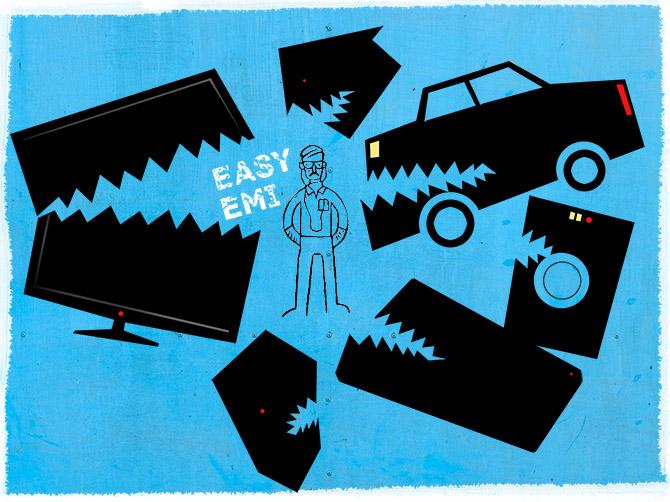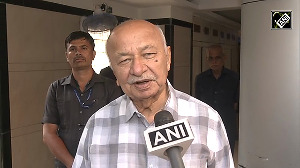The three-month suspension of EMI payments may not result in a significant gains for borrowers as they will be charged interest for the moratorium period, according to the moratorium scheme announced by State-owned banks.
Illustration: Dominic Xavier/Rediff.com.

Last Friday, the RBI had announced that all term loans, including retail and crop loans and working capital payments, will be covered by the three-month moratorium. Banks will now have discretion in deciding the limits on working capital, with RBI saying that no payment miss should be considered a default and reported to credit information companies.
It seems like a double whammy for the borrowers as on one side income has been hit due to the Covid-19 pandemic and on the other hand there is a threat of increased tenure if they opt for RBI relief measure.
In a note to customers, the country's largest lender State Bank of India said, ‘Interest shall continue to accrue on the outstanding portion of the term Loan during the moratorium period’.
The accrued interest will be collected by the lender in the form of additional EMIs from those borrowers who opt for the three-month moratorium.
Explaining the financial burden with the help of an example, SBI said for a home loan of Rs 30 lakh with a remaining maturity of 15 years, the net additional interest would be approx 2.34 lakh equal to 8 EMIs for those borrowers who opt for the moratorium.
Similarly, it said, ‘For an auto loan of Rs 6 lakh with a remaining maturity of 54 months, the additional interest payable would be Rs 19,000 approx equal to additional 1.5 EMIs’.
It further said that customers who do not want to defer the recovery of instalments or EMI need not take any action they may continue to pay in the usual course.
However, SBI said, "Customers who want to defer the recovery of EMI where collections of such installment is effected through the National Automated Clearing House (NACH), please submit an application along with the mandate for NACH Extension to stop for these installments through an e-mail to the specified email ID’.
SBI also issued the list of emails for sending the application for deferment of EMIs.
Releasing a Frequently Asked Questions (FAQ) section, the Indian Banks' Association said that borrowers whose incomes have not been impacted should pay their EMIs in time.
‘You may take the benefits under this (RBI) package if there is a disruption in your cash flows or there is loss of income. However, you must take into account that the interest on the loans, though not mandatorily payable immediately and gets postponed by three months, continues to accrue on your account and results in higher cost,’ IBA, an association of banks, said.
To give you a perspective, it said, ‘Suppose your loan outstanding is Rs 1,00,000 and you are charged 12 per cent rate of interest on your loan, then every month you are liable to pay Rs 1,000 as interest. In case you opt not to service the interest every month, you are liable to pay interest at 12 per cent per annum, and accordingly you will pay Rs 3,030.10 at the end of 3rd month’.
Similarly, in case the interest rate is 10 per cent, you are required to pay Rs 833 per month, or Rs 2,521 after three months, it added.
With regard to credit card dues, IBA said, there is a requirement to pay a minimum amount and if it is not paid the same gets reported to Credit Bureaus but in view of the RBI circular, the overdues in the credit card account do not get reported to the credit bureaus for a period of three months.
‘However, interest will be charged by the credit card issuer on the unpaid amount. You should check from your card provider to arrive at the interest payable. Although no penal interest will be charged during this period, but you must remember that the interest rate on credit card dues are normally much higher compared to normal bank credit and you should take a decision accordingly,’ it said.
PNB Housing Finance said there will be an increase in balance tenure by three months and a possible rise in EMIs for those customers opting for the moratorium.
The RBI notification had said, ‘the repayment schedule for such loans as also the residual tenure, will be shifted across the board by three months after the moratorium period. Interest shall continue to accrue on the outstanding portion of the term loans during the moratorium period’.
Deferred instalments under the moratorium will include principal and/or interest components, bullet repayments, EMIs, credit card dues, the RBI had said.
‘Lending institutions shall frame board-approved policies for providing the above-mentioned reliefs to all eligible borrowers. Wherever the exposure of a lending institution to a borrower is Rs 5 crore or above as on March 1, 2020, the bank shall develop an MIS on the reliefs provided to its borrowers which shall inter alia include borrower-wise and credit-facility wise information regarding the nature and amount of relief granted," it had said.












 © 2025
© 2025